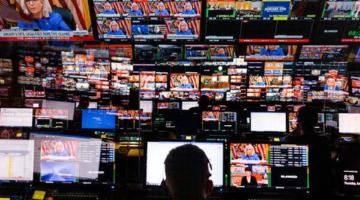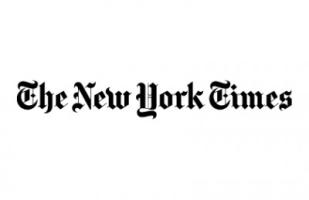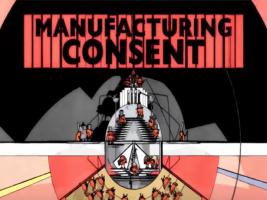U.S. soldiers stand guard behind barbed wire as Afghans sit on a roadside near the military part of the airport in Kabul (Photo: courtesy Wakil Kohsar. AFP via Getty images)
This Black Alliance for Peace Afghanistan update provides analysis of media coverage of the US role in Afghanistan and also links to many news sources.
Originally published in Black Alliance for Peace.
“The media’s the most powerful entity on earth. They have the power to make the innocent guilty and the guilty innocent, and that’s power.” -Malcolm X
For more than 40 years, the U.S. government has waged war in one form or another against the people of Afghanistan, sponsoring violent, reactionary insurgencies, bombing and invading the country, leveling crippling economic sanctions, and expropriating vital assets. Tens of thousands of Afghans have died—and continue to die—from these assaults, while almost 6 million more have been driven from their homes, and the country has been left battered, impoverished, and dependent.
Every step of the way, the U.S. media has provided cover for these violations of Afghan sovereignty, consistently tailoring its narrative to support the U.S. government’s shifting imperial agenda. Whether echoing government claims without adequate investigation, favoring standard tropes of freedom and democracy over facts, or spotlighting some human rights while ignoring others, the media has effectively functioned to drum up public support for—rather than expose—the United States’ long running and continuing war of terror.
The Black Alliance for Peace Solidarity Network’s Afghanistan Committee further examines the role of the media in the U.S. war on Afghanistan in the following interview with Julie Hollar, senior analyst and managing editor at media watch group Fairness & Accuracy In Reporting (FAIR).
Hollar has a Ph.D. in Political Science from the Graduate Center of the City University of New York. Some examples of Hollar’s work on Afghanistan are here, here and here.
According to journalism’s ethics principles, journalists are compelled to serve the public interest by acting as independent “watch dogs,” seeking out truth and holding the government to account. How does this square with the way the mainstream media (MSM) have abetted U.S. wars against countries, like Afghanistan?
Simply put, it doesn't square. When the U.S. government engages in wars abroad, it's extremely rare for [the United States'] most prominent media outlets to do anything other than broadcast official talking points. We did a study of guests on ABC, CBS and NBC in the days after 9/11. Fifty percent were current or former U.S. government officials. Less than 4 percent were from activist or advocacy groups. None were international law experts. Fast forward 20 years to the withdrawal. We looked at the same networks again, and nearly two-thirds of sources were U.S. government or military, while no scholars or antiwar activists from either the United States or Afghanistan were featured.
You have pointed out that the news media have allowed U.S. officials to fashion the narrative regarding U.S. wars. Can you comment on this blurring of lines between the media and the U.S. government, particularly in regard to its coverage of Afghanistan?
During the withdrawal, we saw such things as [a CBS anchor] announcing, “When America leaves, for many, so does the hope—the hope of freedom, the hope for human rights. And in its place comes the sheer terror of what’s next.” This sounds like the U.S. media offering the perspective of Afghan people. But, of course, that's not primarily who they're talking to. Instead, the journalists are getting that perspective through U.S. officials. In other words, it's propaganda, but because corporate media are not state-run, and because they proclaim their deep commitment to “objectivity,” the relationship between government and media is somewhat obscured.
You have written about how the MSM “discovered” women’s rights leading up to the U.S. invasion of Afghanistan, inundating the public with imagery of, in your words, “burqa-clad women in need of liberation,” and then “rediscovered” these women following the withdrawal in order to justify sanctions. Can you talk about the media’s selective focus on “human rights” and how it erases the harm caused by the violence of U.S. wars?
If the primary question is, “How can we support women's rights, anywhere in the world?” the answer will never be “By starting (or refusing to end) a war.” But if the primary question is, "How can we make our war more popular among the public?" introducing a narrative about saving women from oppression looks very appealing. FAIR has documented U.S. media's lack of interest in Afghan women's rights, except when that subject could be used to justify military intervention, which clearly demonstrates that they don't see it as a human rights story, but as a war story. And in fact, if reporters looked too closely at human rights, it would completely undermine the U.S. war projects, because it would highlight the endless violations of rights by those projects. In the Ukraine War, U.S. media have reported a great deal on [alleged] civilian casualties caused by Russia, but you didn't get that same attention in Afghanistan or Iraq, for example, despite the fact that so many were killed and wounded.
Racism clearly permeates U.S. popular media coverage here in the United States, whether overtly as displayed during the onset of the war in Ukraine, or in more subtle ways as seen in the portrayals of racialized migrants and refugees and the use of white saviorism to gain public support for U.S. wars. Why do you think racism is so central to the way U.S. media covers stories involving other countries and peoples? What would be required to transform this fundamental problem?
Racism is central to U.S. media because racism is central to U.S. political, economic and cultural systems. Corporate media have evolved to thrive in that system as it exists, and so challenging it in any fundamental way would threaten their own viability. To transform media, you have to change the environment in which they operate, and to transform that environment, you have to change the media that prop it up. It would be very difficult to tackle them in isolation from each other.
You point out the strategic use of passive and active voice in media stories, such as those regarding the seizure of Afghanistan’s assets that, together with U.S.-imposed sanctions, is starving a majority of Afghans. Can you discuss this manipulation and the ways it’s used to minimize U.S. agency when it comes to violations, while at other times to suggest U.S. benevolence?
A lot of this has to do with perceptions of bias, and journalists’ misplaced commitment to so-called objectivity. Many journalists will claim that if “both sides” complain about their reporting, they must be doing something right. The problem is that sometimes one side is much louder, more powerful, or more extreme than the other side. This holds across issues. But, in the case of foreign policy, outlets are much more concerned about getting complaints about coverage from U.S. officials—who are often important sources for scoops and have much more power to influence journalists’ career and the public's perception of the outlet's biases—than getting complaints from “official enemies.” So you find yourself softening your coverage of the sources who will prompt the most backlash against your reporting.
The U.S. military budgets continue to break records, with reports of it potentially reaching $1 trillion this year. At the same time, despite movements to defund the police, their budgets have increased across the board. Do you see a connection between the way the media drums up support for expanding policing here and expanding U.S. ‘policing’ overseas?
Both have at their heart a deeply symbiotic relationship between media outlets and police/military, which I've alluded to above. Crime and war are stories that sell, that produce clicks and views, and the military and the police give reporters unparalleled access to these stories. Militaries give embedded reporters protection in war zones, [while] police give reporters access to crime scenes. But that kind of access necessarily shapes the kinds of stories those reporters tell. Reporters get their stories, but those stories are really the military’s stories, the police force’s stories. They become allies, and reporters become overly reliant on and trusting of their official sources, and much less open to alternative perspectives.
How do you think the U.S. media functions overall to create and maintain a popular understanding of the rest of the world, a mythology that reflects and promotes the pro-capitalist and imperialist agenda of the U.S. government? What do you see as the role of alternative media such as FAIR in countering that narrative?
The media help establish what are considered realistic or acceptable narratives and policies, partly by simply excluding certain voices or painting them as dangerous or crazy. If the public could hear alternative perspectives that center the needs of people, rather than the needs of the powerful, those perspectives would be normalized, and the visions they put forth would seem realistic rather than extremist or fantastical. That's why independent media are so crucial, because the stories we tell each other shape the possibilities of the world we live in, and the more those people-centered stories push against the corporate media narratives, the more another world is made possible.
ADDITIONAL READING
The Human Consequences of Economic Sanctions
May 4, 2023 by Francisco R. Rodríguez for Center for Economic and Policy Research
In addition to concrete findings on the deadly impacts of sanctions in Venezuela and Iran, this report has found that the U.S.-led sanctions on Afghanistan blocked the country’s access to international funds desperately needed to mitigate widespread hunger and starvation.
As UN ‘Reviews’ Presence in Afghanistan, People Continue to Suffer
April 25, 2023 by Peoples Dispatch
A new report released by the United Nations Development Program raised concerns about the increasingly reduced international aid for Afghanistan since the Taliban took over in 2021, highlighting the severe economic repercussions and the need for reevaluation.
Afghanistan Seeks Boost in Energy Ties with Russia
May 19, 2023 by The Cradle News Desk
The Afghan Minister of Trade and Industry, Nooruddin Azizi, stated that Afghanistan is looking to expand its energy ties with Russia. After a deadly winter with below-freezing temperatures, Afghanistan is in need of around 4 million tons of oil products.
Trust Is So Low That Half of Americans Believe News Organizations Deliberately Mislead Them
February 15, 2023 by David Bauder and the AP in Fortune
A 2023 survey shows low levels of public distrust in U.S. national news sources, with less than a quarter of respondents believing journalists act in the public’s best interest, and half believing a deliberate intent to deceive.
Two Decades and $90 Billion U.S. Dollars Later: Dissecting the Afghan Military's Total Collapse
March 27, 2023 by Kit Klarenberg in MintPressNews
An analysis of the U.S. Special Inspector General for Afghanistan Reconstruction's (SIGAR) investigative "obituary" issued in February on the collapse of the U.S.-sponsored Afghan National Defense and Security Forces, which is a "remarkably uncompromising, no-punches-pulled assessment, exposing corruption, incompetence, lies, and delusion every step of the way" that was accomplished despite "stonewalling" from Pentagon and State Department officials.















